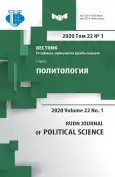Iranian Foreign Policy in the South Caucasus: Identity and National Interests
- Authors: Atrisangari F.1
-
Affiliations:
- Peoples’ Friendship University of Russia (RUDN University)
- Issue: Vol 22, No 1 (2020)
- Pages: 32-48
- Section: CONTEMPORARY POLITICS OF IRAN
- URL: https://journal-vniispk.ru/2313-1438/article/view/322144
- DOI: https://doi.org/10.22363/2313-1438-2020-22-1-32-48
- ID: 322144
Cite item
Full Text
Abstract
Any foreign policy decision of a country is formed on the basis of certain principles and norms that constitute the identity and determine the role of this country. In case with Iran, although the norms that form the identity of the Islamic Republic are diverse and each of them can determine the role of the country outside its geographical borders, none of these norms totally dominates Iran’s foreign policy. Iran is a country located within (or neighboring to) several strategic regions, and in each of these regions it demonstrates different foreign policy strategy based on different norms. For example, Iran’s foreign policy in Transcaucasia is determined by principles and norms which, in some cases, are similar to the principles and norms of Iran’s foreign policy in Western Asia and, in other cases, are different from them. These divergent patterns of behavior can be accounted for by two concepts: identity and national interests. The article aims at clarifying the role of identity in determining Iran’s national interests in Transcaucasia and studies Iran’s foreign policy in the region within the mentioned framework. At the same time, the article seeks to examine the challenges associated with the principles and norms determining foreign policy, as well as identify the shortcomings of Iran’s foreign policy in the Transcaucasian region.
About the authors
Fatemeh Atrisangari
Peoples’ Friendship University of Russia (RUDN University)
Author for correspondence.
Email: fatemeh.atri@yandex.ru
Intern of the Department of Comparative Politics
Miklukho-Maklaya Str., 6, Moscow, Russian Federation, 117198References
- Hopf T. The Promise of Constructivism in International Relations Theory. International Security. 1998; 23 (1): 174–179.
- Wendt A. Collective Identity Formation and the International State. American Political Science Review. 1994; 88 (2): 390–396.
- Smith S. Positivism and Beyond. International Theory: Positivism & Beyond. Ed. by Smith S., Booth K., Zalewski M. Cambridge: Cambridge University Press; 1996: 23–24.
- Dehgani Firuzabadi S.J. Identity and Interest in Foreign Policy of the Islamic Republic of Iran. National Interests of the Islamic Republic of Iran. Ed by Kiyani D. Tehran: Institute for Strategic Studies; 2007: 125–134, 108–148 (In Pers.).
- Druzhilovsky S.B. Internal Factors of the Formation of Foreign Policy of Iran and Turkey. Scientific Schools of MGIMO. 2010; 1: 166–172 (In Russ.).
- Perspective of the Islamic Republic of Iran until 1404 Solar Hijri Year. Expediency Discernment Council. 04.11.2003. Available from: http://www.maslahat.ir/index.jsp?siteid= 3&fkeyid=&siteid=3&pageid=530. Accessed: 01.11.2019 (In Pers.).
- Najafov H.N. Iran and the States of the South Caucasus. Central Asia and the Caucasus. 2008; 55: 41–51 (In Russ.).
- Oflaz B. Geopolitical Strategies of Regional Powers in the South Caucasus. Izvestija Rossijskogo gosudarstvennogo pedagogicheskogo universiteta im. A.I. Gercena. 2013; 161: 146–150 (In Russ.).
- Mayilian E. Relations between Iran and the Countries of the Caucasus: A Political Review. Armenian Museum of Moscow and the Culture of the Nations. 16.04.2018. Available from: https://www.armmuseum.ru/news-blog/2018/4/16/--1. Accessed: 01.11.2019 (In Russ.).
- Khalifa Zadeh M. Iran and the Struggle for Influence in the South Caucasus; The Main Factors in Iranian Foreign Policy. Central Asia and the Caucasus. 2011; 14 (1): 59–71 (In Russ.).
- Tisheyar M., Bahrami S. Iran’s Pragmatic Foreign Policy toward South Caucasus in the Post-JCPOA Era. Central Eurasia Studies. 2018; 1: 30–33 (In Pers.).
- Kuzegar Kalegi V. The Countries of Central Asia and the Caucasus in the Foreign Policy of Iran: The Legacy of the Past and the Future Perspective. Institute for Iran-Eurasia Studies (IRAS). 24.05.2017. Available from: http://www.iras.ir/fa/doc/note/3180/. Accessed: 01.11.2019 (In Pers.).
- Focus on the Development of Military and Defense Cooperation between Iran and the Republic of Azerbaijan. Pars Today News Agency. 16.01.2019. Available from: http://parstoday.com/fa/iran-i158420. Accessed: 01.11.2019 (In Pers.).
- Ilham Alief: Rouhani’s Visit to Azerbaijan is a Sign of the Excellent Relations between Tehran and Baku. TASNIM News Agency. 04.08.2016. Available from: https://www.tasnimnews.com/ fa/news/1395/05/13/1147573. Accessed: 01.11.2019 (In Pers.).
- Ivanov A.G. Russia’s Policy in the South Caucasus in the Context of International Security Problems. Historical and Socio-Educational Thought. 2012; 6: 35–39 (In Russ.).
- The Karabakh Crisis and the Position of the Islamic Republic of Iran; Interview with Afshar Soleimani; former Iranian ambassador to Baku. KHABAR ONLINE News Agency. 24.02.2018. Available from: https://www.khabaronline.ir/news/756724/. Accessed: 01.11.2019 (In Pers.).
- Relations between Iran and Georgia in 2017-2018. Islamic Republic of Iran News Agency. 09.04.2018. Available from: http://www.irna.ir/fa/News/82881833. Accessed: 01.11.2019 (In Pers.).
- Ivanov V.G. The Influence of Dynamics of Export on the Level of Political Stability (on Example of Russia). RUDN Journal of Political Science. 2012; 3: 46–70 (In Russ.).
- Andreeva E.S. Iran’s Interests in the South Caucasus through the Prism of Tehran’s Relations with Armenia. Problems of National Strategy. 2019; 1 (52). Available from: https://riss.ru/wp-content/uploads/2019/03/08.pdf. Accessed: 01.11.2019 (In Russ.).
- Behzadi R. Iran’s Foreign Policy in The Caspian Sea Basin Oscillation between National Interests and Islamic Adventures. Central Asia and the Caucasus. 2010; 11 (3): 98–108 (In Pers.).
- Dehshiri M. Iran’s Public Diplomacy in Transcaucasia: Requirements and Approaches. Institute for Iran – Eurasia Studies (IRAS). 12.03.2018. Available from: http://www.iras.ir/fa/ doc/article/3591/. Accessed: 01.11.2019 (In Pers.).
- Beheshtipur H. Iran Has Problems more Important than Central Asia. CAANetwork. 18.07.2017. Available from: http://caa-network.org/archives/9686. Accessed: 01.11.2019 (In Pers.).
- Kazem Zade H. Iran's Place in the Future Changes of the Caucasus in the Context of “Horizon 2020” of the European Union. Institute for Iran-Eurasia Studies (IRAS). 11.12.2017. Available from: http://www.iras.ir/fa/doc/note/3465/. Accessed: 01.11.2019 (In Pers.).
Supplementary files









